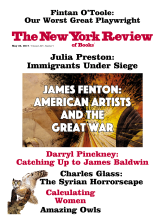In response to:
The Green Universe: A Vision from the October 13, 2016 issue

To the Editors:
In “The Green Universe: A Vision” [NYR, October 13, 2016], Freeman Dyson considers topics from the costs of space exploration to the propagation of life in outer space.
Comparing “Big Space” (large-scale specialized enterprises on behalf of government programs like NASA) and “Little Space” (smaller private sector efforts using widely available technologies) he asserts that NASA’s approach increases cost six hundred fold. But space systems are complex and must work very reliably. The Soviet Union lost many of its early missions, while the US invested heavily in expensive equipment and approaches, to achieve acceptable safety to put a man on the moon while the Russians abandoned their manned lunar program. In missions like Virgin Galactic, failure in the first fifty to one hundred launches—similar to the achieved level of reliability of the shuttle—will be considered too risky and fail.
Professor Dyson finishes with some speculative and fantastical ideas. His vision of a future universe teeming with “life” is one of the more fanciful. He imagines future space ventures where “the purpose is no longer to explore space with unmanned or manned missions, but to expand the domain of life from one small planet to the universe.”
We take issue with some of Professor Dyson’s assumptions and assertions. One is the limited sense he gives to “life.” It is unrealistic to think “life” in space is something we would recognize. Another fundamental objection is to the belief that the universe is open to mankind. Considering humans’ degradation of earth’s environment, failure to avoid pollution, climate change, and the inequality between people, which makes the days of the pharaohs seem positively philanthropic, this seems preposterous. We should have learned from the devastating impact of introducing species into new environments on earth.
As early as the 1960s it was recognized that space needs as much protection from earth-bound elements as the earth does from alien substances of outer space. The 1967 Outer Space Treaty prohibits space activities that cause harmful contamination of space or adverse changes to the environment of the earth. Effort is made not to pollute other planets with earthly bacteria, and the term “planetary protection” is now commonplace in space agency circles.
We also take issue with the term colonize. A fundamental principle of the 1967 treaty is that no state may appropriate any part of space by occupation, claim of sovereignty, or any other means. If mankind settles in space it cannot be claimed as a colony by any country.
Too many voices currently promote exploitation of space, with no concern for the havoc that could be wreaked on our planet as a result. We know virtually nothing about what exists in space, particularly beyond the solar system. A human-designed outer space “teeming with life and action” sounds like a nightmare out of Joseph Conrad.
Simon Altmann
Brasenose College
Oxford University
Oxford, England
Sa’id Mosteshar
Lincoln’s Inn
London Institute of Space Policy and Law
London, England
Alan Smith
Mullard Space Science Laboratory
University College London
London, England
Freeman Dyson replies:
My view of the future universe and the view expressed by Altmann, Mosteshar, and Smith show an interesting clash of cultures. Long ago, Shakespeare showed us the same clash of cultures in a more dramatic setting in his play Twelfth Night, Act 2, Scene 3.
Sir Toby Belch and his friends are disturbing the night with a loud celebration. Malvolio comes downstairs to silence them. Malvolio: “Do ye make an alehouse of my lady’s house, that ye squeak out your coziers’ catches without any mitigation or remorse of voice?” Sir Toby replies: “Dost thou think because thou art virtuous there shall be no more cakes and ale?”
In our views of the future universe, I see myself in the role of Sir Toby and my critics in the role of Malvolio. Two facts about our situation are indisputable. Life is infinitely adaptable, unpredictable, and uncontrollable. And the universe is unimaginably large. So there must always be small patches controlled by local Malvolios with their laws and treaties and enforcers and tax-gatherers. And outside there must always be huge stretches of ungovernable wilderness where Sir Toby and his friends are free to wander.
The finite speed of light ensures that no bureaucratic authority can be effective over large distances. Once life has escaped from this planet, it will be free to evolve and diversify as it pleases. We are a part of nature, and we will have the same freedom.
I am happy to hear views contrary to my own. I hope there will always be clashes of cultures. I hope there will always be Malvolios to engage Sir Toby’s wits. With thanks to my critics.



